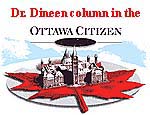

"Should you play doctor with your
doctor?"
August 7, 1998
|
It is an age-old story. Man meets woman; they fall in love and plan to marry. But in this case, there is a twist. A governing institution steps in and says their feelings and plans are inappropriate. The woman is reprimanded for misbehaving and sent to counseling to see the errors of her ways. No, this is not an Islamic story. And, no, it’s not a church or religion that is intervening. The woman is a physician and the man was her patient. And the intervening group is the College of Physicians and Surgeons of B.C. And the misconduct is "engaging in a personal relationship with a patient." And, by the way, neither of them complained or reported it to the College. Remember when family doctors were friends, or the local doctor went to the same church or was on the same bowling team? One knew one’s doctor and trusted him because he knew you too. But no longer is this permissible. Physicians must keep themselves apart, as a class of their own; avoiding what the Colleges call "dual relationships." What underlies this intolerance of the human experience is the theory of a "power imbalance" between doctor and patient. Supposedly the therapeutic relationship is so imbalanced that physicians have all the power and can make patients do and say whatever they want, while patients lack the ability to make judgments or express agreement. In arguing their case, the Colleges rely on the old Freudian notion of "transference" which held that people transfer on to people the attitudes, feelings and reactions that they had in their relationships with early people, such as parents or siblings. So they may react to a doctor, or a teacher, the way they did with their father, both in positive and negative ways. In a simplistic way, Colleges take this theory and conclude that patients unknowingly come to view their doctors as father figures (or mother figures) and then, somehow, starting acting as children and stop thinking for themselves. Stretching this concept even further, some ‘experts’ would have our doctor not just sent to counseling, but to prison. One psychiatric consultant to the Ontario College described her activities as a "struggle to help (the courts) understand that even if (he) was very seductive, that was part of (his) transference or longing." Accordingly, people surrender their ability to consent when they become a doctor’s patient. In our love story, the man lost his rights and became a child. But don’t most relationships, at least professional relationships, have a power imbalance? Certainly my banker or my lawyer has power, as well as access to my very private information. And there have been times when I felt powerless with my car mechanic and building contractor. When the B.C. College was asked about these relationships, their response was: "the doctor/patient relationship is very different from that of client/banker or client lawyer. The patient has to have confidence that the doctor will always act with the patient’s best interests in mind." What does that says about that College’s view of banker s and lawyers? Don’t these professionals have their client’s best interest in mind? And can’t personal relationships contribute something through both a personal knowledge of the patients and a greater concern for their well-being? I’d rather have a doctor who knows and cares about me than one who is remote and technical. I’d rather that they cared "too much" and tried too hard, than that they relied on tables of probability to determine my treatment. Now, in a small minority of cases, doctors drug or extort their patients to secure sexual ‘favours.’ These are neither friendships or acceptable medicine. But in most cases, complaints come out after the relationships have gone sour. And in those situations, as in most instances when a relationship end, someone is angry and wants revenge. In our love story, the man’s wife lodged the complaint, but not against her husband’s behaviour but against the doctor for her supposed abuse of power. All of this is possible because the Colleges want to appear as if they are protecting the public. But are they? In the broader perspective, the intolerance of these regulatory bodies to the feelings and foibles of the human condition, is changing medicine. Physicians, fearful of being misunderstood or of being friendly, are becoming aloof; members of an "untouchable caste." They are being told that they are a powerful profession and must be cautious and benevolent with their patients. And all of this comes at a time when an American Medical Association poll shows that people are losing faith in their doctors, and are becoming distant and focused on money. More than two thirds of those polled felt that their doctors did not spend enough time with the people they care for. Perhaps it is the Colleges and not the doctors who need the counseling, to help them to re-discover their humanity and to rejoin the human race. Meanwhile, have pity for your doctor, caught in the no-win situation of satisfying the Colleges and being human with their patients; people who are their equals in most ways. |
tanadineen.com
@ Dr.Tana
Dineen
1998-2007
by
Dr. Tana Dineen, special columnist,